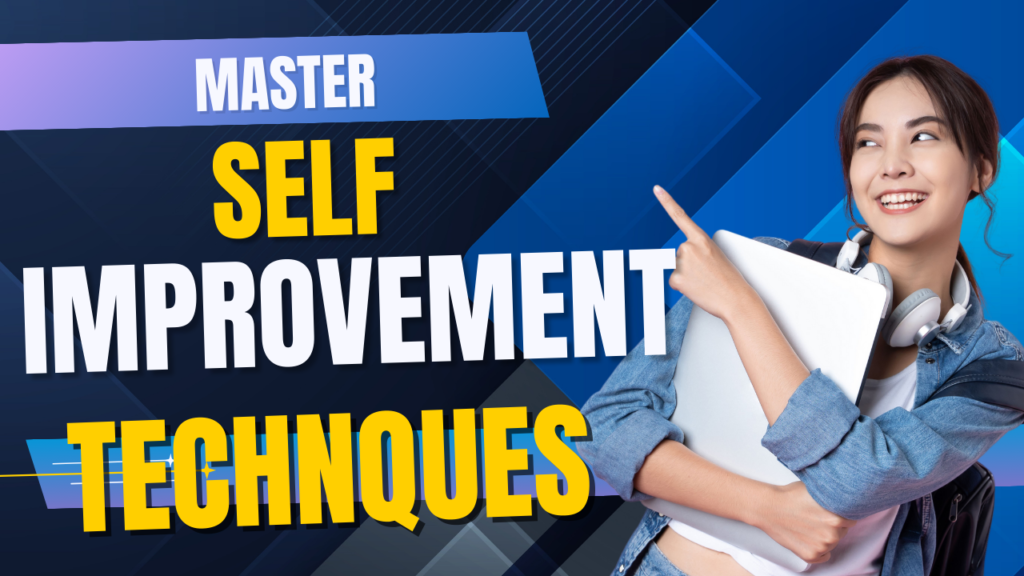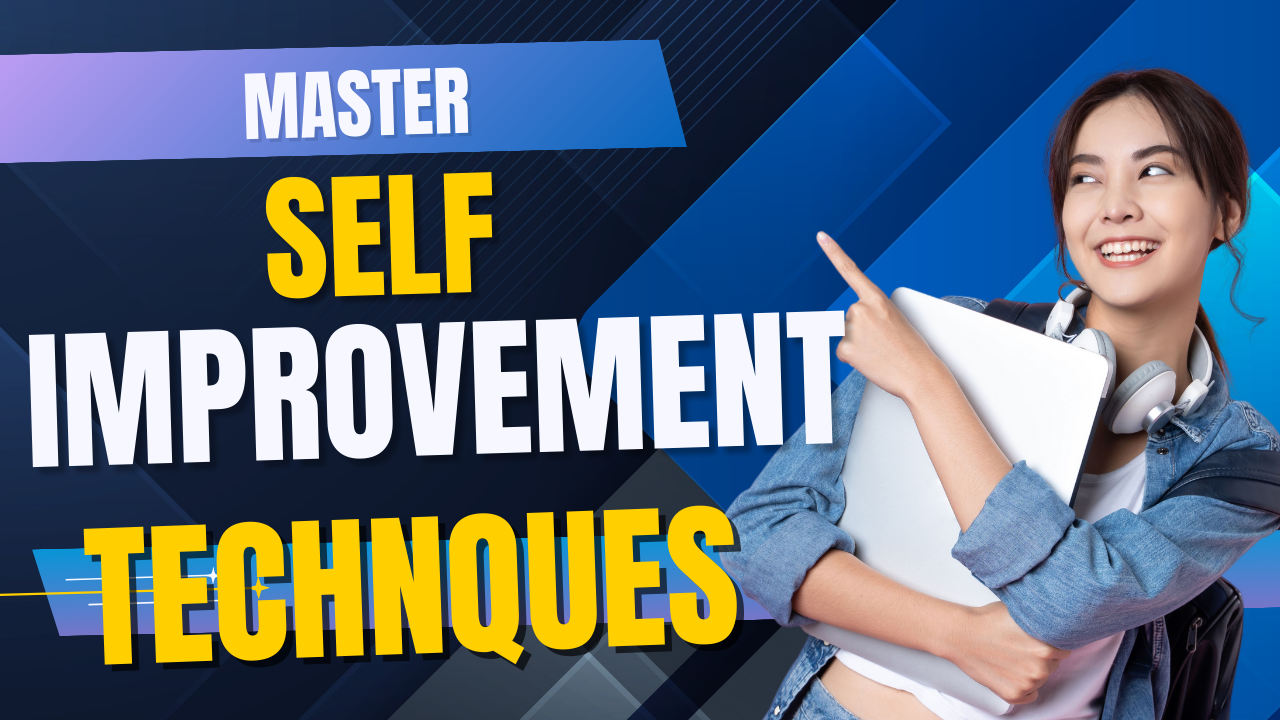
Self improvement is a transformation process that helps an individual become their best self, reach their goals, and live a better life. A beginner can bring about gradual improvement through practical techniques without overloading themselves. Following are some practical self-improvement techniques for a beginner in personal development along with examples so that one can apply them.
Why Start With Practical Techniques?
Self-improvement is a continuous process that encompasses several areas of your life—mental, emotional, physical, and social. First, using simple yet effective techniques ensures incremental improvement without feeling overwhelmed. These methods are stepping stones to long-term growth and success.
Key Principles of Self-Improvement
Being aware of these basic principles first directs your self-improvement process:

1. Start Small
Work on incremental changes that can be incorporated into your daily routine. Small victories build momentum and confidence.
Example: Instead of vowing to read an entire book in a week, commit to reading 10 pages every day.
2. Be Consistent
Consistency is the key to success. Regular efforts yield better outcomes than sporadic spurts of activity.
Example: Practice five minutes of meditation every morning instead of attempting hour-long meditation practice occasionally.
3. Monitor Your Progress
Monitor your progress to stay encouraged and identify areas of improvement.
Example: Utilize an app or notebook to monitor habits of daily achievement such as exercise or learning something new.
4. Growth Mindset
Have confidence in your capability to learn and grow. A growth mindset fosters resiliency and adaptability.
Example: Instead of saying “I can’t do this,” say “I’m learning to do this.”
Good Self-Improvement Strategies

1. SMART Goals
Start with objectives that are:
- Specific: Be specific about what you are attempting to accomplish.
- Measurable: Use tangible measures to track progress.
- Achievable: Make sure the objective is attainable.
- Relevant: Make sure the objective has value-oriented intent.
- Time-bound: Have timelines in place to stay goal-focused.
Example: Rather than “I ought to exercise more,” create a statement such as “Work out three times a week for 30 minutes.”
2. Practice Gratitude
Gratitude enhances mental well-being and positivity. Start by listing three things you’re thankful for each day—whether it’s supportive friends, good health, or small victories.
Example: Write down one thing you’re grateful for every morning in a journal.
3. Develop a Morning Routine
A structured morning routine sets the tone for a productive day. Include activities such as:
- Drinking water
- Stretching or light exercise
- Journaling or meditating for mental clarity
Example: Start your day with a glass of water and five minutes taking time to write down your intentions for the day.
4. Be a Time Master
Effective time management increases productivity and reduces stress. Beginners can attempt:
- Scheduling work using a planner or calendar.
- Prioritizing tasks using the Eisenhower Matrix (urgent vs. important).
- Cutting out multitasking to concentrate on one task at a time.
Example: Schedule your day using time-blocking strategies where every hour is dedicated to a particular task.
5. Maintain Physical Health
Your physical health directly correlates with your level of energy and mood:
- Exercising regularly (e.g., walking, yoga, or gym workouts).
- Healthy and nutritious food.
- Have water throughout the day.
Example: Commit to a 15-minute daily post-dinner evening walk.
6. Meditate Daily
Meditation enhances concentration, eases stress, and boosts mental health. Newcomers can begin with guided meditation apps such as Headspace or Insight Timer for a few minutes.
Example: Meditate for five minutes at night with soothing music or guided voice via an app.
7. Read Daily
Reading enhances vision and distils mental capabilities. Select self-help or an interest book of choice to inculcate reading as a habit.So read daily.
Example: Begin with brief books such as Atomic Habits by James Clear or The Four Agreements by Don Miguel Ruiz.
8. Get Rid of Digital Distractions
Digital distractions minimize productivity and concentration. To remedy this:
- Put screen time limits on your devices.
- Utilize apps such as Forest or Focus@Will to reduce distractions.
- Do a digital detox by staying off social media at times.
Example: Disable notifications while working and set aside some time to check social media.
9. Seek Feedback
Constructive criticism helps you identify blind spots in your behaviour or performance. Seek feedback from individuals you have confidence in, your family, or mentors.
Example: Request feedback from co-workers on improving working with others as part of projects.
10. Start Journaling
Journaling is one of the ways to develop self-knowledge through the ability to reflect on thoughts, emotions, and experiences. It is also an excellent instrument for monitoring progress toward goals.
Task: Document one lesson learned each day and how you will implement it in the future.
Building Healthy Habits

Healthy habits are the building block of personal change. To construct habits that last:
1. Practice Habit Stacking
Stack new habits onto habits you already have to help you roll them in more easily:
Example:
Brush and meditate after morning getting ready.
2. Start 30-Day Challenges
Ensure one undertakes to do a new habit for 30 days so as to stay consistent and install it into way of life.
Example: Try taking two liters of water each day for 30 days as part of elevated hydration regimen.
3. Commend Small Achievement
Reward self on completion of task or on attainment of milestone in order to create positive habit.
Treat oneself with something delightful upon exercising for a week.
Self-improvement is usually followed by obstacles like procrastination or fear of failure. Here’s how beginners can deal with them:
1. Failure as Learning
Take failure as a chance to learn and improve but not to quit.
Example: If you miss a workout session one day, take it as a motivational factor and prepare better the next time without quitting altogether.
2. Stay Accountable
Inform a person near you of your intentions so that they can encourage you and hold you accountable.
Example: Invite a friend who also needs to adopt healthier eating lifestyle changes to talk about food so that the two of you can share recipes and progress reports on a regular basis.
3. Be Patient With Yourself
Change is a time-consuming process-therefore, do not try to change the entire world at once or expect change overnight.
Advanced Ongoing Development Techniques

Once mastered at the primary level, master the following high-level techniques:
1. Self-Ongoing Development
Take classes, workshops, or even gain a new ability like coding or photography or speaking.
2. Donate Your Time
Volunteering develops your sense of empathy, builds your character, and improves your social skills.
3. Network With People Sharing Similar Outlook
Keep good company with people who mentally and emotionally stimulate you and nurture your growth.
Conclusion: Take the First Step Today
Perfection is not improvement but continuous improvement in becoming the best one can possibly be. By taking small steps, being patient, and embracing challenges, beginners can establish a firm foundation of personal development that will stand them in good stead for a lifetime.
Remember: The first step begins the journey—pick one method from this list today and implement it!


Leave a Comment